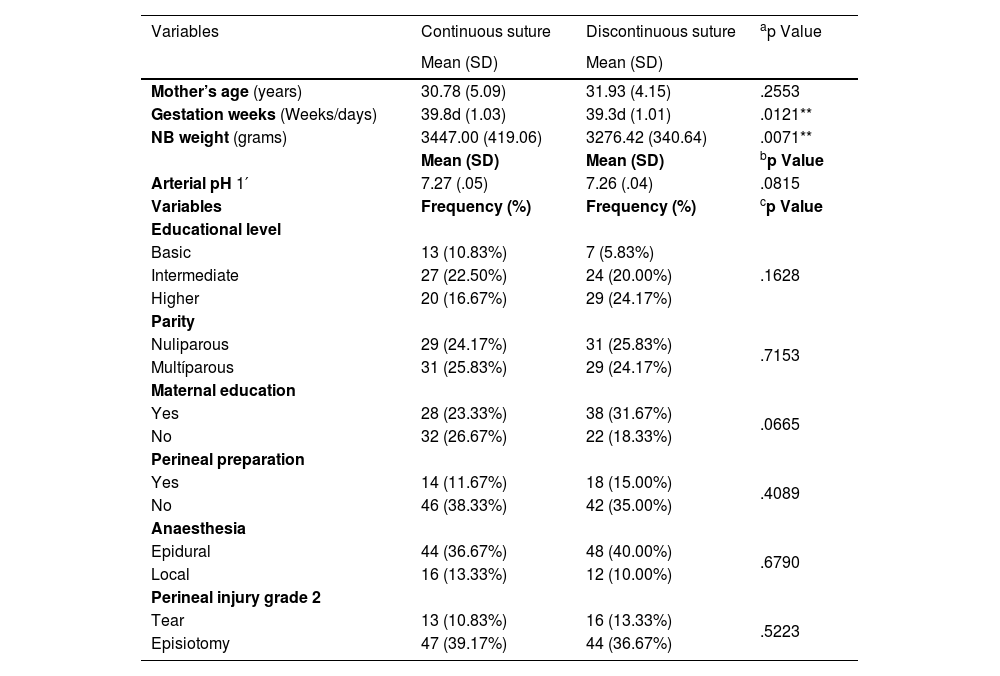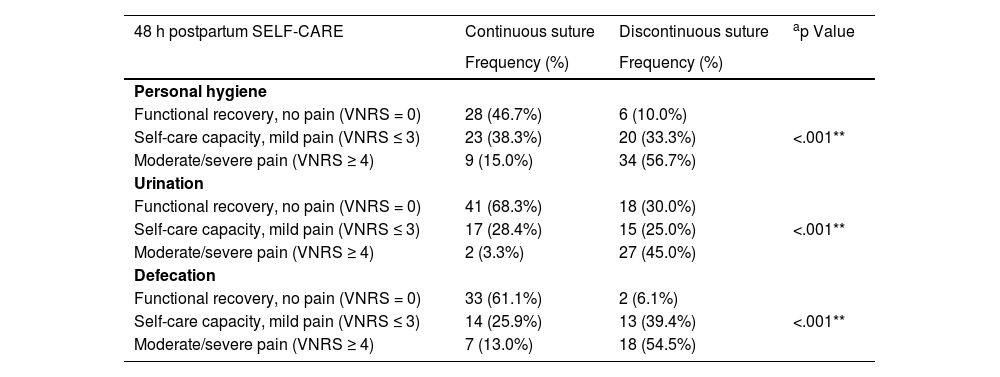To assess the effect of the continuous suture technique of the perineal wound on the capacity and functional recovery of women when carrying out their self-care routine, the care of the newborn (NB), breastfeeding (BF) and Activities of Daily Living (ADLs), both basic activities of daily living (BADL) and instrumental (IADL), during the postpartum period.
MethodsNon-randomised clinical trial with blinding allocation to study groups, carried out at the Arnau de Vilanova tertiary hospital in Lérida. The intervention group received continuous suture for perineal repair and the control group discontinuous suture. The study population was women with eutocic delivery and second-degree perineal tears or episiotomy. Three postpartum assessment were performed (48 h, 7−10 days and one month).
Results126 women with eutocic delivery and second degree perineal tears or episiotomy participated (n = 126); 64 sutured with continuous technique (intervention group) and 62 with discontinuous technique (control group). At 48 h postpartum, 85% of women from the continuous suture technique group were able to perform their self-care and 46,7% of them had recovered functionally. At 7-10 days, 96,7% of women with continuous suturing had acquired the ability to perform instrumental activities of daily living and 60% had recovered functionally compared to 68,3% and 15% respectively of women with discontinuous suturing (p < 0.001). At 7-10 days, 100% of women with continuous suturing achieved functional recovery for newborn care and 80% for breastfeeding and in the control group 81,7% and 30% respectively (p < 0.001 and p < 0.001).
ConclusionsWomen who undergo the continuous suture technique restore their ability and functional recovery to perform activities of daily living earlier and with less pain than women with discontinuous suturing, adapting more quickly and satisfactorily way to motherhood.
Evaluar el efecto de la sutura continua de la herida perineal sobre la capacidad y la recuperación funcional de la mujer para realizar su autocuidado, el cuidado del recién nacido, lactancia materna y las actividades de la vida diaria: básicas e instrumentales, en el periodo posparto.
MétodoEnsayo clínico no aleatorizado con enmascaramiento de la asignación a los grupos de estudio, realizado en el Hospital de tercer nivel Arnau de Vilanova de Lérida. El grupo intervención recibió sutura continua para la reparación perineal y el grupo control sutura discontinua. La población de estudio fueron mujeres con parto eutócico y lesión perineal de segundo grado o episiotomía. Se realizaron 3 valoraciones posparto (48 horas, 7−10 días y al mes).
Resultados126 mujeres con parto eutócico y lesión perineal de segundo grado o episiotomía participaron (n = 126); 64 suturadas con técnica continua (grupo intervención) y 62 con técnica discontinua (grupo control). A las 48 horas posparto, el 85% de las mujeres con sutura continua fueron capaces de realizar su autocuidado y el 46,7% se recuperaron funcionalmente. A los 7–10 días, el 96,7% de las mujeres con sutura continua habían adquirido la capacidad para realizar las actividades instrumentales de la vida diaria y el 60% se habían recuperado funcionalmente frente al 68,3% y 15% respectivamente de las mujeres con sutura discontinua (p < 0.001). A los 7-10 días, el 100% de las mujeres con sutura continua alcanzaron la recuperación funcional para el cuidado del recién nacido y 80% para la lactancia materna y en el grupo control 81,7% y 30% respectivamente (p < 0.001 y p < 0.001).
ConclusiónLas mujeres con sutura continua restablecen su capacidad y la recuperación funcional para la realización de AVD más precozmente y con menos dolor, que las mujeres con sutura discontinua, adaptándose más rápida y satisfactoriamente a la maternidad.












